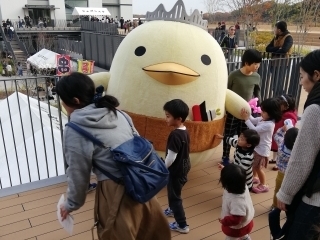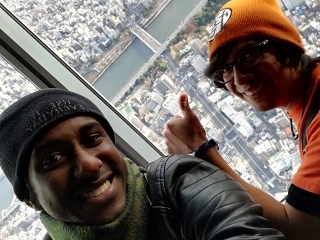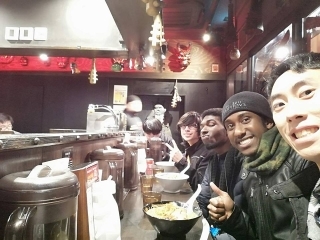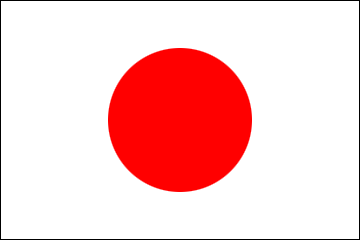JET Programme Series: Cultural Distinctions - Knikkoliev Seebaran



JET Programme Series: Cultural Distinctions - Knikkoliev Seebaran

It’s been 6 months living in the countryside of japan and there are still many surprises I am amazed with every week. A lot of things here still amaze me and some are just confusing. I noticed some differences between Trinidad and Tobago’s and Japan’s culture and for this piece, I want to focus on just three. That is, the level of respect, some confusing Japan customs and their fashion sense.
Respect Bro…
With the little that I have observed so far, Japanese people are very concerned with respecting others – the person, space and time. From the simple act of bowing to show respect to assisting others, they will cautiously approach others while respecting ones’ personal space. Although they would like to know more about people and other cultures, they would rather not impose on another’s time just for personal gain but will quickly keep quiet and observe from afar. I think that it is amazing that their level of respect is so high and they rather restrict themselves from knowing more so they would not hurt another person.
In Trinidad and Tobago culture, everyone wants to know about everyone else and will do whatever it takes to find out. Confrontation is an everyday occurrence in Trinidad and Tobago. I was taught that knowledge is power and you do what it takes to know more. Strangers will approach you in the street, on the bus and start a conversation with questions about where you are going, where you live, who your parents are and any personal question they feel necessary to know more about you.
I believe there are some positives and negatives to these differences but this is just to point out that Japan is completely different from my country in this respect and although I’m doing my best to bridge the gap between cultures, it still is something that I acknowledge and respect about them.
Work work work work work work (Quote from Rihanna)
So many of Japan’s customs are very bewildering to most of the foreigners that visits Japan. Customs such as work ethics, dress code, lifestyle, etc. One of these customs that I have been observing and marveling at is their work ethic.
Case in point, every time I leave work at 4pm, I see my co-workers still busy at work and I am uncertain about what they are doing but they seemed very committed to accomplishing their tasks. One of my co-workers told me that they have to finish their work before they leave and they may leave around 10pm. I was stunned by that comment but after a short discussion with them, I realized that most Japanese people are concerned about completion of their work.
One of my Japanese friends told me that “working” is Japan’s number one priority, then family, then friends and so on. Sometimes, money isn’t a factor. I can’t confirm for all Japanese people but it is surprising how many of them live by this ideology and sees nothing wrong with it. I must admit that, on the positive side, Japan’s customer service reflects that ideology. They are hasty to ensure the most comfortable experience for their customers.
In my country, Sweet TnT, people love to find any reason to celebrate. ‘Work’ priority comes in third to a good time and family. There is a celebration in my country for everything. We are constantly looking for the next reason to celebrate. We work so that we can get the means to enjoy life. The motto is “work to live not live to work”.
It’s Fashion Baby
Maybe it’s where I am placed (Imabari City), but it seems to me that Japan’s need to make others comfortable is reflected in their dress code and lifestyle. It came to my attention that most Japanese people where I live and work, prefer not to stand out from the crowd and try their very best to help each other to be the same.
In comparison, Trinidad and Tobago, is about self and showing uniqueness and dominance when necessary. We don’t want to conform, we want to be different.
Imabari City fashion is very strange to me because of the variety they have and what they choose to wear. I spend a lot of time browsing different clothing stores and it seems to me that almost every store sells the same kind of designs and colours. There are really few stores that have that “extra” in terms of style and colours. I have noticed that clothing stores in japan are very well stocked with varieties of coat, dresses, jerseys, pants, etc. But seems to me that it’s the same designs of muted colours with little to no pattern is on trend here. I think Japanese people prefer these kinds of designs as it helps them fit in because no one likes to stand out, so it is reflected in their clothing choices.
I’m only pointing this out because I would wear bright coloured shirts and everyone would excitedly point out that it’s different. In Trinidad and Tobago’s culture, being unique is part of being Trinidadian and bright colours are the norm that even reflected in our flora and fauna. Taking the risk of going that one step extra with attitude and style is something that has been part of my culture for generations.
Half ah year already!!
The past 6 months has been an exercise in learning Japanese culture and what I would want people to understand is that it is distinctive from Trinidad and Tobago’s culture in a lot of ways. Especially in the country side of the “Nippon”. Being here and experiencing the culture by myself, has developed my understanding and appreciation of so many new and different things about the people and places in Japan. I consider the opportunity to live and work in Japan a well-blessed journey that has changed me. For 6 months, it’s been a joy and a blessing to meet wonderful people, both Japanese and foreigners, and to learn about the differences and similarities in our cultures. There is still so much more to learn and detective Knikk is on the job!
JET Series: Cultural Distinctions (Japanese Embassy's Facebook)
JET Programme Series Archives
